In which the beleaguered reviewer attempts to make some headway into the mounds of CDs seeking reviews accumulating daily by providing quick hits on a few recordings at a time.
Greg Ward's Fitted Shards - "South Side Story"
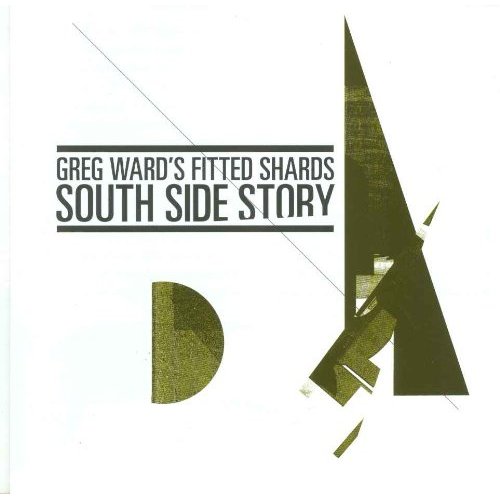 (19/8 Records)
(19/8 Records)
Alto saxophonist Greg Ward is one of Chicago's favorite young players, whose work with the Chicago Afro-Latin Jazz Ensemble, Ted Sirota's Rebel Souls, Mike Reed's People, Places and Things and Jeff Greene's Blink (among others) has been among the best and most exciting work by any young artist in the city. Now relocated to New York - with frequent visits home to Chicago - Ward seems poised to achieve worldwide notice, and the release of his excellent debut - South Side Story should help to spread the word about this emerging artist. On this album of Ward compositions, the saxman is accompanied by his Blink cohorts - drummer Quin Kirchner and bassist Jeff Greene, along with keyboardist Rob Clearfield (Loom, Information Superhighway).
The album kicks off with "Segue" - where Ward's alto criss-crosses over Greene's ostinato bass soon joined by Clearfield's noisy keyboards and Kirchner's crashing drums in a crescendo that unexpectedly morphs into swinging jazz - an apt demonstration of the dichotomy of Ward's musical interests as well as setting the tone for the album itself. "All In" is a pinwheeling composition that lurches and starts across Ward's wide-spread musical canvas. You can almost hear a tint of prog rock in the at-times racous drums, electric bass and synthesizer fills, but then the scene shifts and becomes all out modern, post-bop jazz. Ward's linear movements are graceful yet jagged, melodic yet angular, confident yet probing, but this is no simple showcase for the saxophonist, as all members contribute greatly to the sound.
As in his Blink configuration, Greene is often content to lay back and push the music forward with repetitive bass parts, but here he also spreads into more straight-ahead jazz areas (including lovely arco acoustic bass work) and shows what a sensitive and talented player he is in these styles as well. Kirchner is the perfect choice here as well - adept at succeeding in rock or jazz with both feel and power. This three's familiarity with each other clearly serves them well. Meanwhile, Clearfield is one of the unsung heroes of the Chicago scene - adding his unusual keyboard sounds (at times produced by vintage analog instruments) and shimmering acoustic piano - as on the piano-centered "Castle of Ice." "Step Forward" continues to mine the vein Ward has found - sounding at times as if the prog band King Crimson were discovered recording jazz for ECM - with Clearfield adding a searching electric piano solo before the band ascends to a glorious yet surprisingly understated thematic conclusion.
The polyrhythmic "Instructions" is so filled with energy that it seems likely to explode, while the epic title track starts off softly with Greene's chiming bass and slowly builds before dropping into a quiet piano interlude of great depth and beauty which again expands to bring the band back in for some strong band interplay and hot and tasty saxophone licks. More unison piano and sax lines over ostinato bass open up the gentle "Like Mozart" - which, despite it's title, is pretty jazzy - with a slightly Caribbean melody and tender saxophone work over electric piano. "University of Opportunity," meanwhile is a complex and hard-charging number with great twists and unexpected analog synth tones that will keep the listener on their toes. Ane when you think they can't possibly com up with more, the 12:26 "Fitted Shards" ends the album with a composition that amalgamates many of the directions taken previously into a final event, this time adding in some free-form blowing and band improv for good measure. Clearfield again whips out some vintage synth timbres - giving the Fitted Shards a different aspect than 99% of the jazz bands in existence today, while Kirchner cuts loose with a vigorous drum attack. After all of the intensity of this exciting debut recording, the listener may feel the need to take a few minutes to allow their heart to return to normal, but if you are willing to go for the ride, you are in for an exhilarating listening experience. Like the fitted shards of the band name, these pieces of Ward (and his bandmates)'s musical consciousness fit together (and fall apart) to form beautiful and unexpected designs.
www.nineteeneight.com/
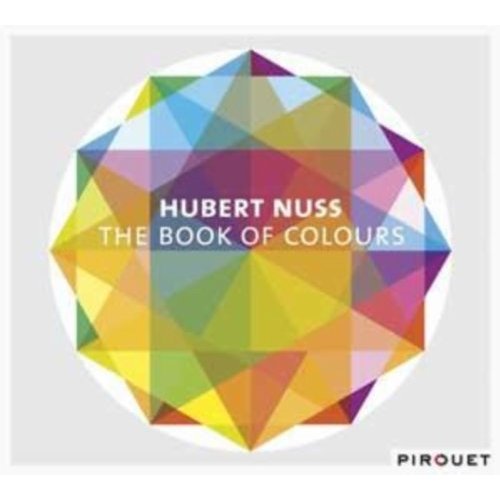 Hubert Nuss - "The Book of Colours"
Hubert Nuss - "The Book of Colours"
(Pirouet)
The modern French composer, Oliver Messiaen (who died in 1992) was one of the most inventive composers in history, yet his works remain woefully underrecorded and his influence somewhat muted - in large part due to his usage of what he called modes of limited transposition: scales which - without delving into theoretical jargon - by their nature do not coalesce well with the usual dominant-tonic resolution structure of Western popular music. However, Messiaen's musical theories (like the better known Debussy - his musical predecessor) have had a subtle influence on the jazz world - whose innovators like Monk, Trane, Bill Evans, Ornette Coleman and Keith Jarrett often explored similar paths in their musical searching. Perhaps no one has integrated Messiaen's approach into jazz as successfully as German pianist Hubert Nuss does here on his amazing The Book of Colours. Working with his long time trio of bassist John Goldsby and drummer John Riley (they've been together since 1997), Nuss masterfully syncronizes the Messiaen approach with the jazz piano trio tradition in hypnotic fashion. Many of the tracks allude to colors produced by artists (Tyrus Wong, Charles Blanc-Gatti, Dominque Louis), nature, galaxies, gems ("The Dark Diamond of Donzek" is a standout track), cities ("Another Kind of Paris" - Messaien swings!), cathedrals, daylight, water, etc... and Nuss often utilizes the Messiaen modes to produce the effect of musical colors. The non-Messiaen-mode-inspired pieces like the stellar, moody "The Three Doomed Men," and rollicking "Night Stars" also impress, with Nuss showing an assured touch in the more traditional structures, while still incorporating unique harmonies into the fabric. These 16 tracks - with none over 6:05 - and many under four-minutes in length - will keep the listener engaged and finding new components to interest them throughout multiple repeat listenings. At times quiet and contemplative, sometimes leaping or dancing, The Book of Colours is without a doubt one of the more interesting trio recordings of the year.
http://www.pirouetrecords.com/home/news.php
The Ray Anderson - Marty Ehrlich Quartet - "Hear You Say - Live in Willisau"
 (Challenge Records)
(Challenge Records)
Former bandmates in Anthony Braxton's band in the '70s: trombonist Ray Anderson and reed player Marty Ehrlich, got back together and formed this quartet with bassist Brad Jones and ubiquitous drummer Matt Wilson in 2009. Jazz fans will glad they did when they hear this wonderful live recording of the group in Willisau, Switzerland from August of that year. The band's ability to move seamlessly from traditional, New Orleans-infused jazz to AACM-style free form - with just about every other style touched upon in the course - is demonstrated immediately with Ehrlich's "Portrait of Leroy Jenkins" which opens the album. This tribute to the late AACM pioneer, who also incorporated elements of traditional jazz into his compositions, features Ehrlich on elegant clarinet contrasting Anderson's bold, brassy bone sound nicely, while rhythm mates Jones and Wilson provide a nearly perfect foundation with kinetic lines and kitchen sink sounds performed with gusto. Anderson responds with "Hot Crab Pot" (the two basically split the writing duties) - a generous gumbo of funky bebop with Anderson shredding and Ehrlich switching over to sax to respond with a great solo of his own, before unison lines and bouyant interchanges between the two take the song out. The delicious interplay continues on the balladic "My Wish" and the free blowing "The Lion's Tanz," while Jones' walking bass propels the fun frolic that is "The Git Go." The joy keeps on coming on the entertainingly hot "Alligator Rhumba" - where Wilson pitches in with a surprising restrained, but still quite enjoyable drum solo. The album ends on a high notes with the ebullient title track - a high-spirited celebration of the blues from this exciting quartet.
www.challengerecords.com/
 Luis Bonilla - "Twilight"
Luis Bonilla - "Twilight"
(NJCO)
Many people may find Luis Bonilla's new album - Twilight somewhat surprising - especially those accustomed to hearing the trombonist blow the roof off with hs pyrotechnic riffs. Not that there isn't plenty of hot playing from the talented Mr. Bonilla, but this time out, he seems to have taken a slightly different approach that emphasizes the band more and veers into mellower and perhaps more mature directions. This new balance makes the album perhaps Bonilla's best yet. The opening title track starts things off gently and mysteriously - with new keyboard player Bruce Barth playing softly on the Fender Rhodes and acoustic bassist Andy McKee adding a tasty bass solo. Drummer John Riley provides the propulsion as the song moves into a more uptempo vein halfway through and Bonilla takes a wonderful and somewhat restrained (for him) solo. Meanwhile, saxophonist Ivan Renta is a great complementary player to Bonilla with a clear yet powerful sound. Following this, the four members of the band each contribute one original each, with Barth's chewy Latin-flavored "The Moon and the Sun" first up and unfurling to produce a midtempo cooker with the composer on acoustic piano this time ad the front line players snaking lines around each other. McKee offers up a delirious blues ("Double Trouble"), while Renta's Vertigo" is a bouncy horn-filled jaunt. Drummer Riley's "Blind Faith" is unsurprisingly the most complex rhythmically - with Renta and Bonilla's horns going crazy on top. Bonilla's "Let it Be Said" is a sad number with heartfelt trombone and sax and lovely Hammond organ work by Barth that just may be the highlight of the album. Of course, the following track - "Visions" could make that claim as well. A gnarly delight of excellent band interplay, this song leads into the finale of "Cork Grease" - which brings back the organ to get down and greasy. A fun, surprising and quite satisfying release from one of the leading trombonists working today.
www.trombonilla.com
Marcus Miller - "A Night in Monte Carlo"
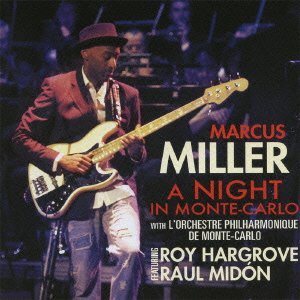 (Concord)
(Concord)
In 2008, bassist Marcus Miller was commissioned to perform a concert of his choosing at the Monte-Carlo Opera House with his quartet (pianist Federico Gonzalez Pena, alto saxophonist Alex Han and drummer Poogie Bell) some special guests and the Monte-Carlo Philharmonic Orchestra. The guests included trumpeter Roy Hargrove, blind singer & guitarist Raul Midon and turntable artist DJ Logic, while the eclectic repertoire presented that night included, among others, originals written by Miller, Gershwin's "I Loves You Porgy," Miles Davis' "So What," a Puccinni aria ("O mio babbino caro") and the Brazilian pop hit "Mas Que Nada." The evening begins with a "Blast!" Miller's Middle-Eastern-flavored fusion number complete with full orchestra bombast, tablas and sitars and Miller shredding on his patented funked-up bass. Miller orchestrated Bill Evans' piano intro into "So What" - which the orchestra plays as a lead in to the tune itself, which features nice solos work from Han, Pena and Miller. But the biggest surprise here may be DJ Logic's scratching as a nice contrast with the smooth strings. Midon performs his "State of Mind" with only Miller and Pena (on udu) accompanying him before Miller soars on delicious fretless bass on the Gershwin track. Miller of course is famous for his association with Miles Davis and here reprises his "Amandla (Freedom)" - the first track on which Hargrove makes an appearance. The veteran trumpet player is currently at the top of his game and certainly among the world's best and it is a rare pleasure hearing him solo with a full orchestra behind him. Hargrove follows this up with a shimmering flugelhorn rendition of the standard "I'm Glad There is You." Miller plays the soprano (voice) part on the Puccinni number before Ridon returns for the carnival finale of "Mas Que Nada" - where Hargrove's trumpet trades licks with the singer's "mouth trumpet." MIller pulls out his bass clarinet for a version of "Amazing Grace" with heartfelt, but maybe unnecessary R&B vocals. A studio set of "Strange Fruit" recorded after the fact is also included. A bit of a mixed assortment, with mostly enjoyable listening - perhaps a bit heavy on the bass solos and R&B touches for many jazz fans, but people who enjoy great bass and trumpet playing with strings will get a kick out of it and Miller's association with this orchestra seems promising.
www.challengerecords.com/
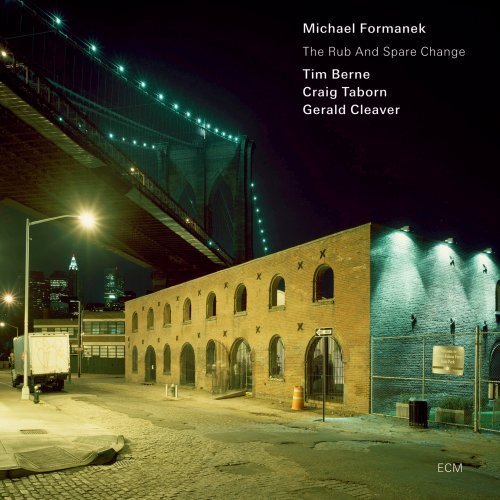 Michael Formanek - "The Rub and Spare Change"
Michael Formanek - "The Rub and Spare Change"
(ECM)
Michael Formanek's bass playing has accompanied many of the stalwarts of the NYC scene, including Tim Berne, Dave Douglas, Lee Konitz, Ira Jane Bloom, the Mingus Big Band, Fred Hersh and more. While he has released several albums as a leader, this one is his debut for ECM, and features Formanek's compositions performed by the bassist with Berne on sax, Craig Taborn on piano and Gerald Cleaver on drums. The names involved in this quartet should be enough to make you want to listen and the album lives up to its promise and more. The opening track - "Twenty-Three Neo" is actually two compositions linked together, with a moody first half based on a 23-beat pattern - that moves into a more uptempo second half. Despite Berne and Taborn's reputations for intensity, the melodic content is allowed to shine through on this track and throughout the album. The title track (another two-parter) starts off with an energy-filled, almost-funky musical landslide that mutates into free form washes of sound. Formanek's rhythmic pulse drives the jangly "Inside the Box" - which features Berne to fine, albeit angular effect. In fact, this is some of the most tasteful and enjoyable playing I've heard from the often paint-peeling saxophonist. Taborn also takes his first extended solo - a ferocious, whiplash inducing attack on the keys which sounds like he is playing his piano on a roller-coaster. Berne sits out "Jack's Last Call" - a heartfelt elegy to a dead friend that seems musically to exhibit the whimsy, missteps, memories and finally joys of friendship itself in its loose configuration and Taborn's leaping piano runs. The epic (17-minute long) "Tonal Suite" is a massive, complex, oblique work filled with dramatic directions and inventive playing by Taborn and Berne over Cleaver and Formanek's shifting odd-rhythm grooves and a hauntingly sublime middle section. Those who consider ECM as the label of peaceful quietude will have to eat their words as the album's final song - "Too Big to Fall" adds one last puncture to deflate that misconception. With Taborn poundng out chords on the piano and Berne taking wide angular swipes - this is an exuberant, heart-pounding end to an exciting ECM debut. Formanek's compositions are noteworthy in that the bass drives everything and the two primary soloists are given a great deal of freedom, but that the compositions themselves are still coherent and melodic. The bassist's reputation as a descendant of the great Charles Mingus is heightened by this release. Stylistic the two are dissimilar, yet they take a correlative approach to writing bass-centered band arrangements that push the boundaries.
www.ecmmusic.com
Tony Succar - "Live at the Wertheim Performing Arts Center"
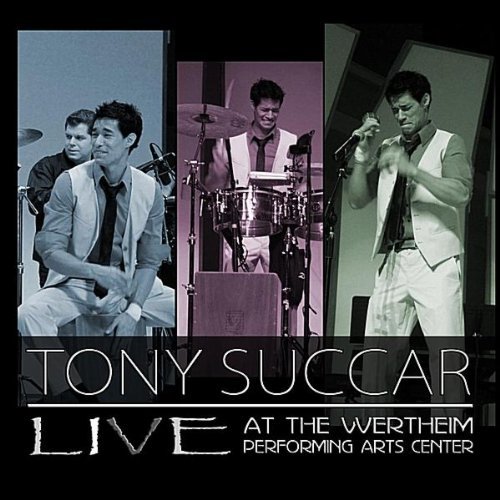 (Mixtura Productions)
(Mixtura Productions)
Peru-born, Miami-raised percussionist Tony Succar grew up in a musical family and is a bright young light on the South Florida music scene. On this live recording, Succar mixes multi-cultural musical styles from Peru, Cuba and more as he and his band raise the roof with some hot arrangements of Herbie Hancock's "Eye of the Hurricane," Wayne Shorter's "Adam's Apple" Monk's "Bemsha Swing" and four spicy originals. That this recording is of Succar's senior recital from college should not dissuade you, as the quality of musicians involved and Succar's interesting charts are of a high rate. Stellar Argentinean bassist Augustin Conti, keyboardists Sammy Gali and Mauricio Quiros and a strong horn section of Henry Paz (sax & flute), Jesus Mato (trumpet) and Ruben Caban (trombone) join Succar and fellow percussionsts Goro Castillo and Mike Lozana in putting on a very entertaining concert. Vocalists Alfredo Lugo and Mimy Succar (the young man's talented and lovely mother) join in the fun, as do several dancers - all of which can be seen on the accompanying DVD of the performance. The songs certainly stand on their own - Succar's interesting Latin takes on the cover tunes are quite intriguing and surprisingly fresh - and his own tunes are quite good as well, but viewing the DVD does increase the fun with nice visuals to accompany the sounds. Percussion heavy, but with delicate touches like Paz' lilting flute on "Pa Oyichan" - a subtle highlight. An exciting fusion of South America, Cuba, Jazz and South Beach flavor from an up and coming artist who will almost certainly be heard from more in the future.
www.tonysuccar.com/
 Leo Wadada Smith and Ed Blackwell - "The Blue Mountain's Sun Drummer"
Leo Wadada Smith and Ed Blackwell - "The Blue Mountain's Sun Drummer"
(Kabell Records)
A trumpet/drums duet may seem an odd combination and a grouping that would seem unikely to offer much in the way of producing an interesting and entertaining album-length recording, but when the parties involved are Wadada Leo Smith and Ed Blackwell, all bets are off. Smith - the talented early AACM reed innovator - has seen a recent burst of creative energy and a subsequent resurgence of interest in his earlier work, while the late Blackwell is best known as the drummer in Ornette Coleman's free-jazz quartet. This live concert from Brandeis University outside of Boston dates from 1986 was unrehearsed - something that is hard to believe considering the obvious connection between the two players. The compositions (all by Smith) also surprise in that they reveal a more melodic aspect to Smith's output than many have heard before. Smith also opens up the music by also performing on flugelhorn, flute. mbira and singing his poetic lyrics as well. Blackwell, meanwhile is a marvel - playing many different styles - from straight ahead and funk rhythms to free form pulsing while keeping the beat in place. "Uprising" opens up with Smith playing a fanfare and Blackwell shifting into a deliriously intricate pattern of snare, hi-hat, tom and bass drum over which Smith improvises brilliantly. "Love" continues this style and at times even seems like a "song" emerges, but the duo playfully distort the structures, with Blackwell unexpectedly switching over to rim shots and Smith to a muted sound. Smith accompanies his warm, African-inflected singing voice with his mbira (thumb piano), while Blackwell adds percussive gongs on "Seeds of a Forgotten Flower." Meanwhile, "The Blue Mountain's Sun Drummer" is another great example of Blackwell's mastery of rhythms - with his tom work a virtual clinic. "Mto: The Celestial River" is another highlight for Blackwell, while Smith also does some of his finest playing. The switch to flugelhorn on the quiet "Sellassie" brings forth more of Smith's beautiful improvisation and he moves again to flute in midstream with great success during "Seven Arrows in the Garden of Light." Avant garde, yes, but highly accessible due to the high level of the melodic content and the sensitive interplay between two virtuoso musicians, this recording is a testament to a magic moment in time.
www.wadadaleosmith.com
Boris Kozlov - "Double Standard"
 Russian-born bassist Kozlov is one of the standout bassists on the NYC scene - working with the Mingus Big Band, Arturo O'Farrill, Jean-Michel Pilc, Bobby Sanabria and more. Here he does what seems impossible in releasing an album of solo bass that manages to swing and entertain the listener on this unwieldy instrument. Duke Ellington is famously remembered for likening bass solos to a "train wreck" (despite having players like the great Jimmy Blanton and Oscar Pettiford in his band) and although the bass is now often considered equal to the other instruments as a soloist in the jazz world, entire albums of solo bass are rare indeed. Fortunately, Kozlov is a brilliant player - one of the best working in jazz today - with technique to spare. Here he balances three of his own pieces with covers of standards such as Miles Davis' "Solar," Billy Strayhorn's "Isfahan," Joe Henderson's "Inner Urge," Charles Mingus' "Self Portrait in 3 Colors," John Coltrane's "Satellite," Horace Silver's "Peace," Scott LaFaro's "Gloria's Step" and Stevie Wonder's "Overjoyed." His superb intonation - developed from years of classical study - is matched by his inventiveness. The Strayhorn piece is shocking in that Kozlov can nearly create the colors from the horn charts with his bass, while "Inner Urge" nearly burns down the house. Kozlov whips out his overdubbed bowed bass on top of his pizzicato plucking on the Mingus number and then adds more layers of bowed parts on this exciting track. Kozlov plays Charles Mingus 1927 Roth bass on this recording and it sounds wonderful. Clearly this album is not going to be for everyone, but it truly is quite wonderful playing and will please not only fans of the bass, but anyone interested in hearing a virtuoso performer take on this challenge.
Russian-born bassist Kozlov is one of the standout bassists on the NYC scene - working with the Mingus Big Band, Arturo O'Farrill, Jean-Michel Pilc, Bobby Sanabria and more. Here he does what seems impossible in releasing an album of solo bass that manages to swing and entertain the listener on this unwieldy instrument. Duke Ellington is famously remembered for likening bass solos to a "train wreck" (despite having players like the great Jimmy Blanton and Oscar Pettiford in his band) and although the bass is now often considered equal to the other instruments as a soloist in the jazz world, entire albums of solo bass are rare indeed. Fortunately, Kozlov is a brilliant player - one of the best working in jazz today - with technique to spare. Here he balances three of his own pieces with covers of standards such as Miles Davis' "Solar," Billy Strayhorn's "Isfahan," Joe Henderson's "Inner Urge," Charles Mingus' "Self Portrait in 3 Colors," John Coltrane's "Satellite," Horace Silver's "Peace," Scott LaFaro's "Gloria's Step" and Stevie Wonder's "Overjoyed." His superb intonation - developed from years of classical study - is matched by his inventiveness. The Strayhorn piece is shocking in that Kozlov can nearly create the colors from the horn charts with his bass, while "Inner Urge" nearly burns down the house. Kozlov whips out his overdubbed bowed bass on top of his pizzicato plucking on the Mingus number and then adds more layers of bowed parts on this exciting track. Kozlov plays Charles Mingus 1927 Roth bass on this recording and it sounds wonderful. Clearly this album is not going to be for everyone, but it truly is quite wonderful playing and will please not only fans of the bass, but anyone interested in hearing a virtuoso performer take on this challenge.
www.borisbass.com/
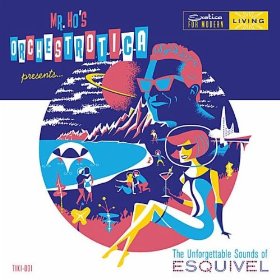 Mr. Ho's Orchestrotica - "The Unforgettable Sounds of Esquivel"
Mr. Ho's Orchestrotica - "The Unforgettable Sounds of Esquivel"
The patron saint of the genre of 1960s space age bachelor pad music was undoubtedly the swinging Mexican-born Juan Garcia Esquivel - known simply as Esquivel. An early pioneer in the newly discovered sound technology of "stereo" - Esquivel created soundscapes that combined wild percussion, sound effects, wacky nonsense vocals (ie: his trademark "Zu, zu, zu"), steel guitars, accordions, organ, film scores, whistling, Latin jazz, pop and classical in a melange of lounge music at its most incendiary and inventive. Because Esquivel never performed his studio orchestra tracks live and his original scores were lost, his music is rarely, if ever, presented live these days. But, thankfully, for fans of the genre, Boston-based "Mr. Ho" (percussionist/pianist Brian O'Neill) has painstakingly transcribed these lost arrangements by ear from Equivel's original recordings, and he and his 23-piece Orchestrotica (including several members of the Boston Pops and the Either/Orchestra's Russ Gershon) recreated these numbers using the latest digital technology. The joyous results will have Esquivel fans as well as wanna-be hipsters smiling with glee. Nearly all of the numbers are Equivel-arranged standards like "Night and Day," "Take the A Train" and "Sentimental Journey," but one highlight is his ever popular "Mini Skirt" - perhaps the grooviest selection here. Alternately goofy and charming and still exciting after all these years - Mr. Ho and his group have given this hi-fi adventurer and purveyor of sonic martinis and bikinis his long-warrented due.
www.orchestrotica.com
Jazz Folk - "Jazz in the Stone Age"
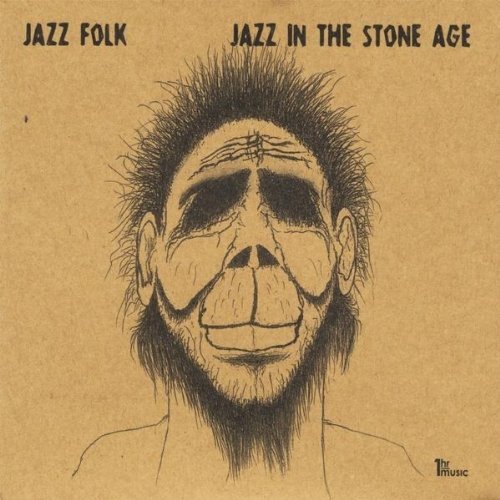
Jazz Folk are a trio consisting of Hong Kong-based bassist Peter Sherr and two Aussie jazzers - drummer Simon Barker and pianist Matt McMahon. They three have played together off and on for several years, but seem to have hit upon an interesting format here in reinterpreting a surprising array of folk and rock songs. Songs on this release are taken from Taj Mahal, Joni Mitchell, Lou Reed and Jerry Garcia, with three numbers coming from Beck (Hansen)'s Mutations recording. Mahal's bluesy "Corinna" makes for an upbeat opener, while Mitchell's early "Song About the Midway" is given a loving treatment which caresses the song's delicate melody. Beck's morose and sitar-laden "Nobody's Fault But My Own" is slowed to a crawl and becomes a delightful jazz ballad in the process, while his "Tropicalia" (a bonus track on the original album - here called "Tropicalian Shadows") is perhaps the jazziest number on the Jazz Folk's recording. The two Lou Reed (Velvet Underground) tracks follow. "Pale Blue Eyes" is one of Reed's loveliest melodies, while the grandiose "All Tomorrow Parties" works shockingly well in the Jazz Folk's capable hands - especially the second overdubbed piano part on the intense ending. It is clear that a great deal of thought and care went into the reinvention of these tunes. The Grateful Dead's canon is mined for the slow blues of "To Lay Me Down" and the choice proves to be an excellent one - providing a beautiful, almost gospel meditation. Beck's "Cold Brains" is given some electronic treatments and Sherr even adds distorted electric guitar, but the arrangement shines and showcases the memorable melody (something Beck's own productions sometimes fail to do) - highlighted by a barrage of piano runs. Obviously, all three members are strong musicians with a love of a wide range of various genres of music and the ability to work together to create a new mixture of these styles in a jazz vein. Fans of jazz, rock and folk will thoroughly enjoy this stone age trio's clever work.
www.creativemusicinchina.com/
